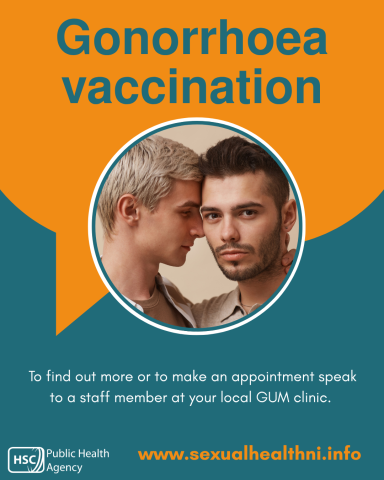Gonorrhoea vaccination programme for Northern Ireland

A new gonorrhoea vaccination programme will commence in Northern Ireland in August and the Public Health Agency (PHA) is encouraging eligible people to make an appointment for vaccination to help protect them and their sexual partners against infection.
From August, eligible people, which includes gay men, bisexual men and other men who have sex with men (GBMSM) who have a recent history of multiple sexual partners or a sexually transmitted infection (STI), will start to be offered the vaccine, with two doses advised.
This follows advice from the Joint Committee on Vaccination and Immunisation (JCVI), which recommended roll out of vaccination following an upsurge in gonorrhoea diagnoses.
Rachel Spiers, Immunisation and Vaccination Programme Manager at the PHA, said: “In recent years we have seen an increase in gonorrhoea cases. It is now the most commonly diagnosed bacterial STI in Northern Ireland, with some infections being particularly resistant to treatment. So by offering the vaccine to those most at risk it will not only help to protect them against the disease but will also help to reduce the spread.
“The vaccine provides around 30 to 40% protection against gonorrhoea, which is good news and will help reduce the chance of infection and passing it on to other partners, although it will still be important to continue to use condoms for protection against gonorrhoea and other sexually transmitted infections such as syphilis.
“The vaccine itself is a meningococcal group B vaccine which has been used in the UK routine immunisation programme for some time. Recent research has shown that the vaccine may also offer some protection against gonorrhoea.
“The PHA would strongly encourage eligible people to take up the offer and get both doses to reduce the risk to themselves and others”
The vaccine will be available through GUM clinics within local Health and Social Care Trusts.
For more information on GUM clinics see
- www.sexualhealthni.info/visiting-gum-clinic or to make an appointment speak to a staff member at your local GUM clinic.
For more information on gonorrhoea and the vaccine see
- Gonorrhoea is a bacterial sexually transmitted infection (STI) caused by the Neisseria gonorrhoeae bacterium. Gonorrhoea is transmitted through condomless vaginal, oral or anal sex, or genital contact with an infected partner.
- Even if an infected person has no symptoms the infection can still be transmitted. Typical symptoms of infection may include thick green or yellow discharge from the vagina or penis and pain on urination. Infection may also result in complications: pelvic inflammatory disease, ectopic pregnancy and infertility in women and other people who have a womb or ovaries, and painful infection in the testicles and prostate in men and other people who have testicles or a prostate.
- Gonorrhoea is now the most commonly diagnosed bacterial STI in NI. Around 8 out of 10 gonorrhoea infections occur in men; gay and bisexual men are most commonly affected. Gonorrhoea causes symptoms in 9 out of 10 men and 5 out of 10 women.
- Gonorrhoea diagnoses in NI have risen sharply since 2022. Total gonorrhoea diagnosed in 2022 (1606) was 2.5x higher than the previous year (652), and this high level of gonorrhoea diagnosis was sustained in 2023. There was a small decline in 2024 to 1,208 cases. [Number of new episodes for selected STIs 2014-2024.pdf]
